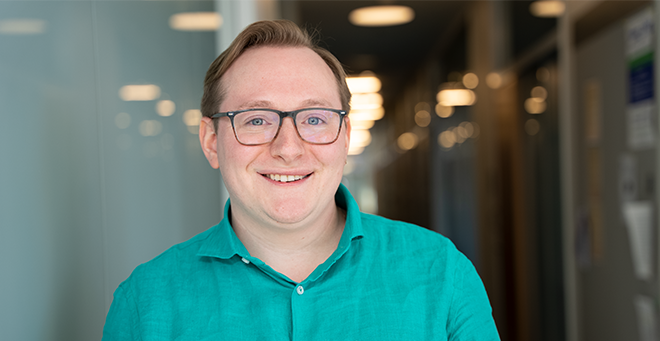 David Keener, a PhD candidate in the Morningside Graduate School of Biomedical Sciences Interdisciplinary Graduate Program, has received a Ruth L. Kirschstein National Research Service Award Individual Predoctoral Fellowship from the National Institute for Neurological Diseases and Stroke. The grant will help fund Keener’s project on Rett syndrome, a genetic neurodevelopmental disease generally diagnosed in girls 6 to 18 months old that eventually robs patients of their ability to speak, walk or use their hands.
David Keener, a PhD candidate in the Morningside Graduate School of Biomedical Sciences Interdisciplinary Graduate Program, has received a Ruth L. Kirschstein National Research Service Award Individual Predoctoral Fellowship from the National Institute for Neurological Diseases and Stroke. The grant will help fund Keener’s project on Rett syndrome, a genetic neurodevelopmental disease generally diagnosed in girls 6 to 18 months old that eventually robs patients of their ability to speak, walk or use their hands.
“Being awarded the grant means a lot to me. It represents me being able to pay my own way through the rest of my graduate studies, and it means that the NIH found my project of high enough importance and impact,” Keener said.
Rett syndrome is caused by mutations in a gene called MeCP2, which is a master regulator of gene expression in the brain. Working with mentor Jonathan Watts, PhD, professor of RNA therapeutics, Keener is focused on mRNA-based delivery of the prime editing machinery to neural cells, as well as the creation of more nuclease-stable synthetic prime editing guide RNAs to target these mutations.
“Prime editing is uniquely well-placed to correct many kinds of genetic mutations, including the most common cause of Rett syndrome,” said Dr. Watts. “It’s exciting to combine this NIH fellowship with support from the Rett Syndrome Research Trust and move a new treatment option closer to helping patients. The work David will do during this fellowship will help develop platform technologies to make prime editing easier to apply and treat other diseases.”
Keener remembers wanting to become a scientist as a child growing up in Needham. He earned a bachelor’s degree in neurobiology and minored in Spanish at the University of Rochester. When he applied to UMass Chan, Keener thought he’d pursue neurobiology or bacteriology because of his previous experiences working as a lab technician for a pharma startup that made antibiotic small molecules.
“Instead, I made a personal connection to the Watts Lab and found myself fitting in well with that group,” said Keener. “I’ve had to learn all about RNA biology and synthetic chemistry on the fly, but I love it. To me, who you work with is of equal importance to what you work on.”
Keener credits Emily Haberlin, PhD, senior science writer in the department, who assists RNA Therapeutics Institute students in applying for grants, with helping him earn the award.
Related UMass Chan news stories:
Melissa Goulding receives highly competitive NIH Kirschstein Award
Prestigious NIH Kirschstein Award to fund MD/PhD student’s research into impact of structural racism on health
Lauren O’Connor receives prestigious NIH Kirschstein Award
Rett Syndrome Research Trust provides $2.7 million in new funding for research